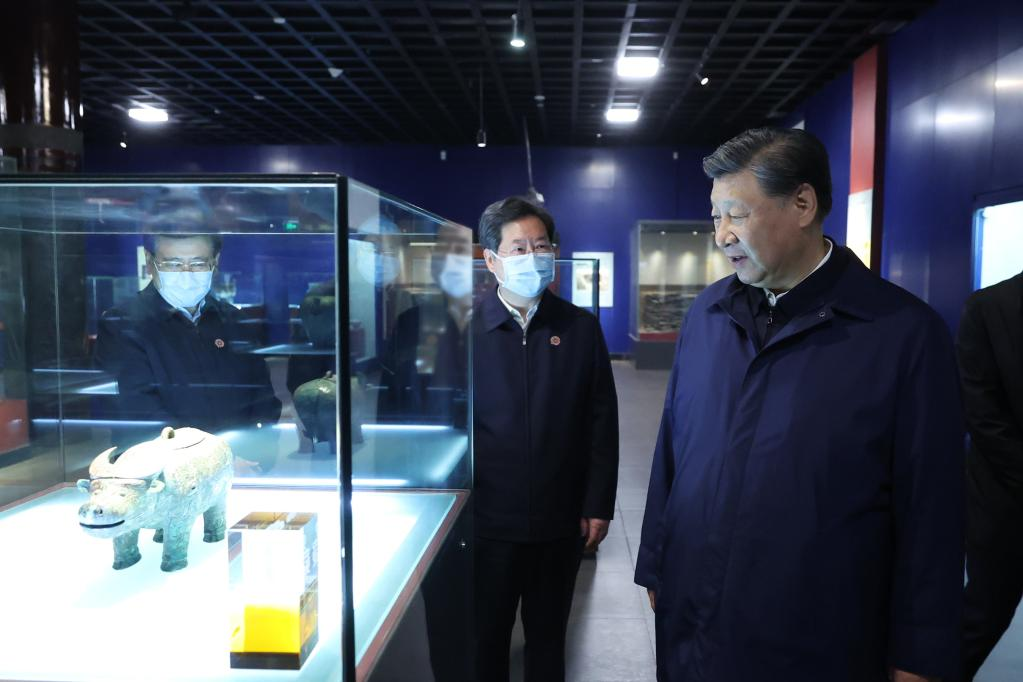Xi Jinping Thought on Culture was put forward for the first time during a recent national meeting on public communication and culture.
Culture has been incorporated into the Xi Jinping Thought on Socialism with Chinese Characteristics for a New Era, following Xi Jinping Thought on Strengthening the Military, Economy, Ecological Civilization, Diplomacy and the Rule of Law.
In his instruction made public at the national meeting over the weekend (October 7-8), President Xi Jinping stressed building stronger cultural confidence, following the approach of openness and inclusiveness, and upholding fundamental principles while breaking new ground to provide a strong ideological guarantee, spiritual strength and favorable cultural conditions for building a modern socialist country in all respects and advancing the great rejuvenation of the Chinese nation on all fronts.
Since the 18th National Congress of the Communist Party of China (CPC) in 2012, Xi has placed the work of public communication and culture in a prominent position, giving instructions and guidance in art, journalism, philosophy and social sciences, and culture, among others.
The work of culture is extremely crucial to the future and destiny of the Party, the long-term stability of the country, and the cohesion and centripetal force of the nation, Xi said in the instruction.
Xi introduced the concept of confidence in culture. He incorporated the core socialist values into the basic policy underpinning the endeavor to uphold and develop socialism with Chinese characteristics in the new era.
He also set clear tasks for public communication and culture: to uphold socialism with Chinese characteristics, rally public support, cultivate generations of young people with sound values and ethics, develop Chinese culture, and better present China to the world.
The cultural missions for the country are to further advance cultural prosperity, to build a leading country in culture and to foster the modern Chinese civilization, Xi said at a meeting on cultural inheritance and development in June.
During Xi's inspection trips, he paid particular attention to the work of culture as he had visited multiple museums as well as historical and cultural blocks.

Chinese President Xi Jinping, also general secretary of the Communist Party of China Central Committee and chairman of the Central Military Commission, visits the Yin Ruins in the northwest suburbs of Anyang, central China's Henan Province, October 28, 2022. /Xinhua
Chinese President Xi Jinping, also general secretary of the Communist Party of China Central Committee and chairman of the Central Military Commission, visits the Yin Ruins in the northwest suburbs of Anyang, central China's Henan Province, October 28, 2022. /Xinhua
In October 2022, Xi visited the Yin Ruins, which was the capital site of late Shang Dynasty around 3,300 years ago, during his inspection tour to Anyang City in central China's Henan Province.
Xi urged efforts to carry forward the fine traditional culture through discovery, research and conservation of cultural relics. He stressed that fine traditional Chinese culture is the root of the Party's new theories, and the ultimate approach of adapting Marxism to the Chinese context and the needs of the times is to integrate the basic tenets of Marxism with China's specific realities and fine traditional culture.
Domestically, Xi's thought on culture provides both a strong material foundation and spiritual strength for China's national rejuvenation. Globally, Xi's thought also demonstrates China's commitment to cultural exchanges.
In his instruction, Xi called for following the approach of openness and inclusiveness, and made requirements in enhancing international communication capacity and promoting exchanges and mutual learning among civilizations.
(With input from Xinhua)